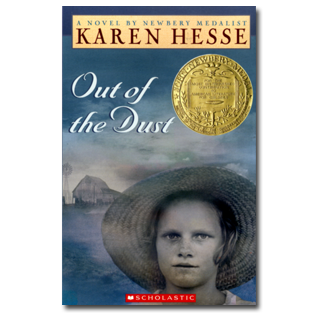
image from childrensbookalmanac.com
Karen Hesse's Out of the Dust (Scholastic Press, 1997)is my most recent read in my quest to conquer all the Newbery-award-winning books. At the onset, I was pretty certain I wasn't going to enjoy it. The book is written in verse and I'm not big on reading poetry. However, I quickly became engrossed in the story. It helped that there wasn't a rhyming, sing-songy pattern to the writing and I was able to read it mostly as prose.
The story is set in the Dust Bowl during the depression. As is often true of a good story, this one worked for me because it did such an excellent job transporting me to a particular time and place. I still have to point out that in the well-established Newbery tradition, this book focuses on an orphaned coming-of-age girl. At least this book makes the loss of Billie Jo's mother a part of the story.
For my own writing, the lesson I take away is the importance of research. Hesse wasn't even alive during the depression or the Dust Bowl era. For this book to work, though, she clearly had to do a phenomenal amount of research so that it felt authentic.
With my latest project, Abigail's Atlantis, research becomes pivotal on two fronts. 12-year-old Abigail learns all about sea turtles while visiting her grandparents at Topsail Island for the summer. That brings about its own amount of research, but on top of that I am learning about Atlantis because of the parallel Atlantis-set storyline which will mirror Abigail's.
When researched properly a story - like Out of the Dust - becomes intriguing because the setting feels completely natural and real in the context of its story. In fact, while an author should have the basic story in mind from the onset, the writer should welcome whatever twists and turns the research may add to the story. It will make the journey more authentic.











No comments:
Post a Comment